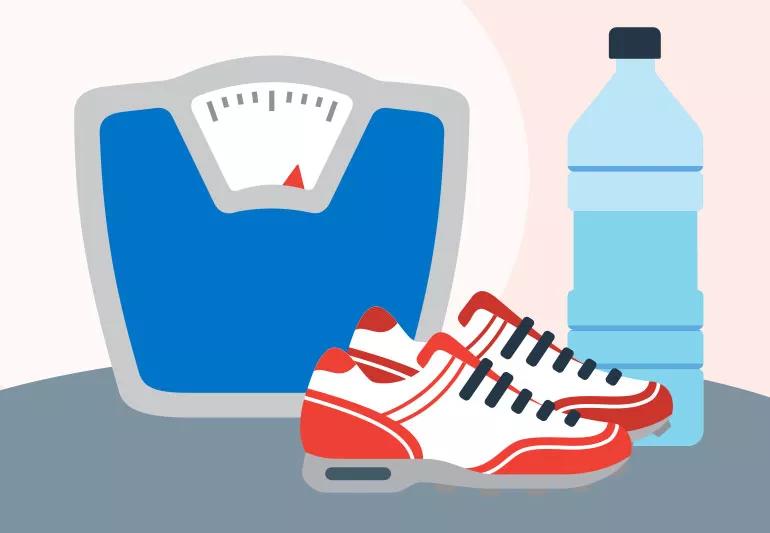Having obesity brings long-term health risks no matter your fitness level

If someone spends hours a week running on a treadmill, pumping iron in a weight room or pedaling on a bike, you’d probably consider them healthy and fit. But what if that person also qualifies as having obesity? Would your opinion change?
Advertisement
Cleveland Clinic is a non-profit academic medical center. Advertising on our site helps support our mission. We do not endorse non-Cleveland Clinic products or services. Policy
There’s a long-running debate about whether it’s possible to be “fit and fat” at the same time. Exercise is healthy, after all. So, if you’re getting in your workouts, all that physical activity must “override” health risks that come with carrying pounds of excess fat mass … right?
The answer isn’t quite that simple says cardiologist Leslie Cho, MD. Here’s why.
“Fit and fat” is a colorful phrase — and it certainly rolls off the tongue easier than “metabolically healthy obesity (MHO).“ That’s the more medically driven term used when someone is overweight but doesn’t have other risk factors associated with cardiovascular disease.
Obesity is defined by body mass — specifically, having too much body mass. A screening tool known as body mass index (BMI) typically is used to gauge whether someone has obesity. The formula uses height and weight to estimate body fat. A BMI of 30+ is the traditional benchmark for obesity.
Now, it should be noted that BMI is a notoriously problematic measurement tool. A bodybuilder who looks capable of bench pressing a pickup truck would register a higher BMI because muscle weighs more than fat. Race and ethnicity also can skew what’s a “good” or “bad” BMI.
Advertisement
But for now, BMI is the standard. So, let’s move on with the discussion.
Having obesity often goes hand in hand with other health issues, including elevated blood pressure, high cholesterol, Type 2 diabetes and poor cardiovascular fitness. “Having obesity puts extra strain on your body, and your heart in particular,” states Dr. Cho.
But not everyone with obesity has other related health issues, which is where the concept of MHO enters the picture.
Video content: This video is available to watch online.
View video online (https://cdnapisec.kaltura.com/p/2207941/sp/220794100/playManifest/entryId/1_w7jqd1bn/flavorId/1_5f3sgelj/format/url/protocol/https/a.mp4)
Does Weight Impact Your Heart?
This is where the situation becomes a bit more complicated, notes Dr. Cho. Let’s look at it from a short-term and long-term perspective.
Obesity and fitness can co-exist. “There are people with excess weight who are avid exercisers,” emphasizes Dr. Cho. “If that describes you, there’s no question that your workouts are benefiting your body. You’ll see results.”
Physical activity can keep blood pressure and cholesterol levels within target ranges — a positive health outcome. A few good sweaty workouts a week also can help prevent the onset of Type 2 diabetes.
Bottom line? “You’re better off exercising than not exercising,” she says.
Now the bad news: Working out a few times a week doesn’t permanently block health issues related to excess weight. Those extra pounds eventually take a toll on your body and contribute to metabolic syndrome heart disease risk factors.
An analysis done through the Multi-Ethnic Study of Atherosclerosis (MESA) found that MHO doesn’t reliably predict future risk. In fact, nearly half of tracked individuals with MHO and no risk factors eventually developed them.
“Studies have consistently shown that people who maintain obesity for a long period of time tend to eventually have high blood pressure, cardiovascular disease, diabetes, sleep apnea and increased risk of cancer,” shares Dr. Cho. “So, even with fitness, the risk doesn’t go away.”
Another worry? People with obesity who are fit may overestimate their health, which could delay getting a diagnosis and treatment of conditions that need attention.
The short answer is yes. “One of the ways we prevent heart disease is by managing our weight,” says Dr. Cho. “Data shows that it’s a critical factor when it comes to preventing high blood pressure, high cholesterol and diabetes.”
Weight, of course, is a sensitive topic that comes with cultural baggage. Dr. Cho asks that we look past the idea that being thinner is just about fitting into a smaller pant size.
“Maintaining a healthy weight is about living a long time with a high quality of life,” she says. “Think of it as helping you not have a heart attack, not have a stroke and not need blood pressure or cholesterol medicine. That’s the relationship to build with your weight.”
Advertisement
Pay particular attention to your waist circumference and body shape. People who carry excess fat around their midsection and have an “apple shape” tend to have higher rates of cardiovascular disease, notes Dr. Cho. This visceral fat tends to surround and stress vital organs such as your stomach, liver and intestines.
The U.S. Centers for Disease Control and Prevention (CDC) says that the risk of obesity-related health conditions in adults increases if waist circumference is:
As with BMI, though, waist circumference guidelines can vary slightly with race and ethnicity.
There’s no one single way to lose pounds, but any weight-loss program typically revolves around two factors: reduced calorie intake and an increase in physical activity.
There are numerous eating plans available to help you build a healthy and nutritious diet, says Dr. Cho. And if you’re looking to start an exercise program, something as simple as a daily walk can help you drop unwanted pounds.
Talk to your healthcare provider to find a plan that works for you.
“Being fit is always healthier for you, but it does not negate being overweight,” reiterates Dr. Cho. “You can’t carry excess body weight without there being repercussions. Losing a few pounds can make a big difference for your long-term health.”
Advertisement

Sign up for our Health Essentials emails for expert guidance on nutrition, fitness, sleep, skin care and more.
Learn more about our editorial process.
Advertisement

No one diet is right for everyone — but the Cleveland Clinic Diet app meets your personalized needs

Constantly thinking about food can make it hard to maintain a healthy weight and can lead to other health issues

Hormones, water retention and even exercise can play a part in daily weight changes

Consistency is a big part of weight tracking

Maintaining a healthy weight, focusing on exercise and eating a well-balanced diet can improve your overall metabolic health

This diabetes medication can treat obesity, but it’s not for people who just want to drop a few pounds

Successful weight loss takes a long-term commitment — build a healthy lifestyle you can stick with

Overweight and obesity increase your CKD risk, and may speed disease progression in people who have the condition

Even small moments of time outdoors can help reduce stress, boost mood and restore a sense of calm

A correct prescription helps your eyes see clearly — but as natural changes occur, you may need stronger or different eyeglasses

Both are medical emergencies, but they are very distinct events with different causes